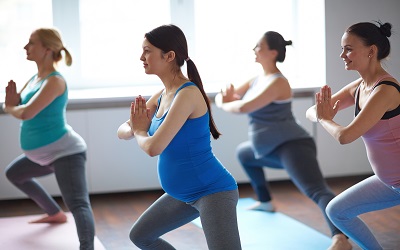Exercising during pregnancy is safe for most women — and it comes with many benefits, including:
• Less backache, constipation, bloating, and swelling
• Improved mood, energy, and sleep
• Healthy weight gain during pregnancy and better postpartum recovery
• Stronger heart, muscles, and endurance
• Reduced risk of gestational diabetes, postpartum depression, and some complications in labour
Talk to Your Provider First
Most pregnant women can exercise safely, but check with your healthcare provider before starting or changing your routine — especially if you have:
Start Slow or Continue at Your Pace
• If you exercised regularly before pregnancy, you can usually keep your routine (with modifications).
• If you’re new to exercise, begin with 5–10 minutes daily and build up to 150 minutes per week (e.g., 30 minutes, 5 days a week).
Choose Pregnancy-Safe Activities
Good options:
• Walking, swimming, stationary cycling
• Low-impact aerobics
• Strength training with light weights
• Modified yoga or Pilates (avoid “hot” classes)
Avoid:
• Contact sports (basketball, soccer)
• High-risk fall activities (horseback riding, skiing, mountain biking)
• Scuba diving
• Exercise in very hot or humid conditions
Make Pregnancy Modifications
• Wear supportive shoes and a good maternity sports bra.
• After the first trimester, avoid lying flat on your back — use pillows or wedges to prop yourself up.
• Don’t stand still for long periods; keep moving.
• Change positions slowly to avoid dizziness.
• Avoid high-impact moves if your joints hurt.
Warm Up, Cool Down, and Stay Hydrated
• Warm up for 5–8 minutes at a low intensity before workouts.
• Cool down with light movement and stretching.
• Drink plenty of water before, during, and after exercise — dehydration can cause overheating and even trigger contractions.
Prevent Overheating
• Wear loose, breathable layers.
• Avoid hot yoga/Pilates and outdoor workouts in extreme heat.
• Stop if you feel dizzy, nauseated, unusually warm, or short of br
Listen to Your Body
• You should be able to carry on a conversation while exercising.
• Stop immediately if you have:
o Vaginal bleeding
o Dizziness or headache
o Chest pain or difficulty breathing
o Fluid leakage, regular contractions, or severe pain
• Rest as much as you need — workouts should energize you, not drain you.
Keep It Consistent — and Fun





